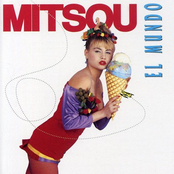El Mundo

Biography
Mitsou Annie Marie Gélinas (born September 1, 1970) is a Canadian pop singer, businesswoman, television and radio host, and actress. She is credited as Mitsou Gélinas when acting, but records simply as Mitsou (the French pronunciation of mitsu, which means honey in Japanese) Born in Loretteville, Quebec, Mitsou is the granddaughter of Quebec actor Gratien Gélinas. She got involved in acting and modelling as a child, but also began to pursue singing in her teenage years. In 1988, she signed with...
Mitsou Annie Marie Gélinas (born September 1, 1970) is a Canadian pop singer, businesswoman, television and radio host, and actress. She is credited as Mitsou Gélinas when acting, but records simply as Mitsou (the French pronunciation of mitsu, which means honey in Japanese)
Born in Loretteville, Quebec, Mitsou is the granddaughter of Quebec actor Gratien Gélinas. She got involved in acting and modelling as a child, but also began to pursue singing in her teenage years. In 1988, she signed with Canadian independent Isba Records and released her first single, "Bye Bye Mon Cowboy" (composed and produced by Jean-Pierre Isaac), which became a smash pop hit across Canada (an extremely rare feat for a francophone song). Later that year, she followed with her debut, multicultural-themed album, El Mundo which also spawned the singles "La Corrida" and "Les Chinois". "Bye Bye Mon Cowboy" was later remixed by Shep Pettibone and re-released for the American market with a new video.
In 1990, she released her follow-up album, Terre des Hommes. Ivan Doroschuk (formerly of Men Without Hats) wrote the title track as well as her first English-language song "A Funny Place (The World Is)". She also changed her image by dyeing her hair reddish-brown instead of her trademark blonde.
The first single, "Mademoiselle Anne", failed to replicate her cross-Canada success, but in 1991 the second single, "Dis-Moi, Dis-Moi", put Mitsou back in the spotlight with a controversial video that showed her and several male and female models nude in a shower room. The video, which was released only a few months after Madonna's "Justify My Love", was banned by MuchMusic (as the Madonna video had been).
Having banned two high-profile pop videos within a few months of each other, MuchMusic created a new occasional late-night series, Too Much 4 Much, on which they would play banned videos along with forum and panel discussions on the controversies these videos raised. Due to the controversy, Mitsou's single was played across Canada even though the lyrics (which Mitsou co-wrote) were exclusively in French.
Her 1992 followup EP, Heading West, was a collection of past hits and new material in English and French. Despite a title track co-written by Cyndi Lauper, and the radio and video play given the dance-driven single "Deep Kiss", it failed to generate a substantial pop hit. In 1993, she followed it up with her first full-English album Tempted. Although the lead single was written by RuPaul ("Everybody Say Love"), the album again failed to give her a significant hit. The video for "Everybody Say Love" featured nudity (as well as homosexuality) but failed to stir any media attention.
Subsequently, she returned to recording primarily French-language material for her 1994 album Ya Ya which included cover versions of songs popular in Québec in the '60s and '70s such as the title track and "Comme j'ai toujours envie d'aimer". She also released a Christmas album entitled Noel in 1995 that included some Quebec holiday classics.
After a hiatus, her next album, mitsou (Éponyme) (1999), featured hip-hop-influenced beats and a street-oriented rock sound. She also co-wrote and co-produced all the tracks. A club-oriented EP Vibe followed in 2002. It features remixes of previous material such as "Bye Bye Mon Cowboy" (which was re-recorded and released as a single) and "Money Penny". Read more on Last.fm. User-contributed text is available under the Creative Commons By-SA License; additional terms may apply.

